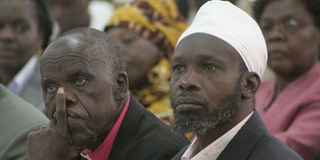Clerics push for minimum Kenya reforms

Participants follow proceedings during a meeting of the National Council of Churches of Kenya executive committee in Limuru on Wednesday. Photo/JAMES NJUGUNA
Protestant religious leaders have called for minimum constitutional reforms to avoid a repeat of the 2008 poll-related violence.
In a move likely to throw the law review process off balance, the National Council of Churches of Kenya (NCCK), warned of a resounding rejection of the draft constitution being prepared by the Committee of Experts.
The clerics expressed their misgivings over the country’s ability to enact a new law before the 2012 elections and called for short-term changes they termed “stabilisation reforms”.
Feeling insecure
The clergy, in a statement issued after a two-day meeting in Limuru, said Kenywas precariously moving towards a repeat of violence as prospects of a new constitution diminish each passing day.
“Kenyans are feeling insecure and are stockpiling weapons. Politicians are making statements that are inflammatory and inciting,” said the Rev Canon Peter Karanja, the NCCK general secretary.
The clerics were outraged by the manner in which the experts were conducting themselves as midwives of a new constitution. “It is foolhardy for anybody who was here (Kenya) last year to subject the destiny of a country to a document whose process many Kenyans have no confidence in,” warned the Rev Karanja.
Although they did not rule out a new constitution before the next elections, the group said the Committee of Experts had failed to consult widely and publish contentious and non-contentious issues.
“We have advised the committee that it was not competent enough to handle religious courts. We proposed that religious groups be brought together to iron out the issues, but the team has since decided the kadhi’s courts are not contentious.”
Although appearing to be diplomatic in their call for more consultations and inclusion of their views, the church leaders warned the tussle over the law review could be settled by the ballot.
“Any recklessness on the part of the committee and Parliament will be unstoppable unless in a referendum. This would be tragic as it would undo all the gains we have made,” said the NCCK general secretary.
The proposal floated by House Speaker Kenneth Marende that two versions of the draft be presented at the referendum was not possible, he said, insisting that the experts had failed to produce a list of contentious and non-contentious issues for debate to come up with only one document.
“The review law provides for one document that we can vote for or against. But Marende is leading people who have power to change the law, but this must be interrogated critically,” he said.
General elections
At the height of the 1997 and 2002 general elections, calls for minimum reforms were made as a temporary measure before the comprehensive reforms. That the same calls are being made at this time indicates that a new constitution will continue to be elusive.
The uncharacteristically hard stance of the NCCK comes barely two days after another religious grouping, the Kenya Christian Constitutional Forum (KCCF), called for the resignation of the committee’s chairman, Mr Nzamba Kitonga and the entire team, accusing them of being a stumbling block to a new law.
The KCCF, which brings together evangelical churches, has vowed to use the pulpit to drum up opposition against the draft constitution.




